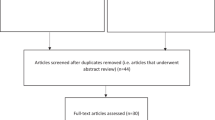Abstract
This paper offers arguments to justify the relevance of psychoanalysis—psychoanalyses—in present-day Argentina and reflects on the stance taken by psychoanalysts with different theoretical perspectives in the face of the havoc wreaked by state terror (1976–1983). To this end, the author focuses on the pioneers’ traits, the significance of the Argentine Psychoanalytic Association in the 1950s and 1960s, and the impact of the departure of the Plataforma Group in 1971. The establishment of the latter opened the way for the development of a psychoanalysis tied to popular movements, sensitive to social conflict, and close to human rights organizations. The author explores both on psychoanalysts’ intervention to address the social trauma resulting from the theft of babies during the dictatorship, and on their relationship with Grandmothers of Plaza de Mayo.
Similar content being viewed by others
References
Abraham, N. & Torok, M. (1994). The shell and the kernel. Nicholas T. Rand (Trans.). Chicago: The University of Chicago Press.
Abuelas de Plaza de Mayo (Eds.). (1997). Restitución de niños [Child restitution]. Buenos Aires: Eudeba.
Altamirano, C. & Sarlo, B. (1983). Literatura/Sociedad [Literature/Society]. Buenos Aires: Hachette.
Bleichmar, S. (1997). El traumatismo en la apropiación-restitución [Trauma in appropriation-restitution]. In Abuelas de Plaza de Mayo (Eds.), Restitución de niños (pp. 182–187). Buenos Aires: Eudeba.
Braun, J. (2015). Trauma colectivo y reparación social [Collective trauma and social reparation]. In Presented at the International Psychoanalytic Congress, Boston, July 2015.
Castel, R. (1984). La gestión de los riesgos. De la antipsiquiatría al post-análisis [Risk management: From anti-psychiatry to post-analysis]. N. Pérez de Lara (Trans.). Barcelona: Anagrama.
Doltó, F. (1986). Religión y psicoanálisis [Religion and psychoanalysis]. Interview. Revista Psyché, 3, 2–5.
Erős, F. (2016). Psychoanalysis and the emigration of Central and Eastern European intellectuals. The American Journal of Psychoanalysis, 76(4), 399–413.
García Reinoso, G. (1986). Matar la muerte. [Killing death]. Revista Psyché, 1.
Gondar, J. (Issue Editor) (2017). Special Issue. Trauma and subjectivity: A South American perspective. American Journal of Psychoanalysis, 77(1).
Hollander, N. C. (1992). Psychoanalysis and state terror in Argentina. American Journal of Psychoanalysis, 52, 273–289.
Hollander, N. C. (1997). Love in a time of hate. Liberation psychology in Latin America. New Jersey: Rutgers University Press.
Hollander, N. C. (2011). Psycho-political dynamics of the bystander in Luis Puenzo’s “the Official Story”. International Journal of Applied Psychoanalytic Studies, 8, 147–161.
Langer, M. (1972). Cuestionamos (Vol. 2). Buenos Aires: Granica.
Prebisch, R. (1949). The economic development of Latin America and its principal problems. New York: United Nations, 1950 [El desarrollo económico de la América Latina y algunos de sus principales problemas. Santiago de Chile: ECLAC].
Quijano, A. (2000). Coloniality of power and eurocentrism in Latin America. International Sociology, 15, 215–232. Colonialidad del poder, eurocentrismo y América Latina. In Eduardo Lander (Ed.), La colonialidad del saber: eurocentrismo y ciencias sociales. Perspectivas latinoamericanas (pp. 201–246). Buenos Aires: Consejo Latinoamericano de Ciencias Sociales.
Ricoeur, P. (1992). Appropriation: Hermeneutics and the human sciences. Cambridge: Cambridge University Press.
Russo, J. A. (2012). The social diffusion of psychoanalysis during the Brazilian military Regime: psychological awareness in an age of political repression. In J. Damousi & M. B. Plotkin (Eds.), Psychoanalysis and politics: Histories of psychoanalysis under conditions of restricted political freedom (pp. 165–184). NY: Oxford Universities Press.
Vianna, B. H. (2000). The Lobo–Cabernite affair. Journal of the American Psychoanalytic Association, 48, 1023–1029.
Volnovich, J. C. (1997). Las Abuelas, entre dioses y ausencias [Grandmothers, between gods and absences] In Abuelas de Plaza de Mayo (Eds.), Restitución de Niños. Buenos Aires: Eudeba.
Author information
Authors and Affiliations
Corresponding author
Additional information
Address correspondence to Dr. Juan Carlos Volnovich, Callao 1185 4B, Buenos Aires, Argentina.
*This paper is part of the Special Issue Trauma and Subjectivity: A South American Perspective (Gondar, 2017).
Rights and permissions
About this article
Cite this article
Volnovich, J.C. Trauma and Contemporary Forms of Subjectivity: Contributions of Argentine Psychoanalysis* . Am J Psychoanal 77, 7–22 (2017). https://doi.org/10.1057/s11231-016-9083-0
Published:
Issue Date:
DOI: https://doi.org/10.1057/s11231-016-9083-0



